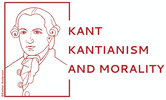What we do
The two NWO grants (see below for details) fund postdoctoral researchers and PhD candidates who work on various aspects of Kant's and/or Kantian moral philosophy. Together, we want to explore new ways of interpreting, evaluating, and/or defending Kantian forms of moral universalism. In addition to our individual research activities, we conduct regular meetings in which we read and discuss each other's work, texts by Kant and Kantian theorists, their critics, and secondary literature. We also invite external researchers to give talks and/or discuss their written work with us. In the near future, we will organize conferences and workshops on project-related themes.
The NWO grant "Universal Moral Laws: A New Approach to Kant and Kantian Ethics"
The NWO-funded research program "Universal Moral Laws" runs from 1 January 2019 to 31 December 2023. Here's the program description:
"Immanuel Kant (1724-1804) is one of the most important philosophers of all time and the main representative of a paradigmatic approach in ethics that defends moral universalism. Nevertheless, many of his core arguments are widely considered unsuccessful. In particular, his account of the principle of morality and his defence of freedom of the will seem to face fatal objections. The leading idea behind this program is that these objections stem largely from a failure to recognize that crucial elements of Kant’s ethics, as developed in his main works on the subject of the 1780s, should be viewed in light of the political theory he defended at the time. This has caused core concepts to be misinterpreted and core arguments to be misunderstood. This circumstance, in turn, is due to the fact that our main source for Kant’s political theory of the 1780s was, until recently, surrounded by difficulties. This program takes advantage of the fact that it has now become much easier to use this text for scholarly purposes. The research program is expected to yield a markedly improved understanding of the structure and defensibility of Kant’s ethics, with important implications for current ethics, especially concerning the principle of morality and the defence of freedom of the will. The program aims to develop a new account of one of the preeminent frameworks for conceiving of our human moral obligations and to spell out its practical application."
"Immanuel Kant (1724-1804) is one of the most important philosophers of all time and the main representative of a paradigmatic approach in ethics that defends moral universalism. Nevertheless, many of his core arguments are widely considered unsuccessful. In particular, his account of the principle of morality and his defence of freedom of the will seem to face fatal objections. The leading idea behind this program is that these objections stem largely from a failure to recognize that crucial elements of Kant’s ethics, as developed in his main works on the subject of the 1780s, should be viewed in light of the political theory he defended at the time. This has caused core concepts to be misinterpreted and core arguments to be misunderstood. This circumstance, in turn, is due to the fact that our main source for Kant’s political theory of the 1780s was, until recently, surrounded by difficulties. This program takes advantage of the fact that it has now become much easier to use this text for scholarly purposes. The research program is expected to yield a markedly improved understanding of the structure and defensibility of Kant’s ethics, with important implications for current ethics, especially concerning the principle of morality and the defence of freedom of the will. The program aims to develop a new account of one of the preeminent frameworks for conceiving of our human moral obligations and to spell out its practical application."
The Spinoza Prize
In 2020, Pauline Kleingeld was awarded the Spinoza Prize. The Spinoza Prize project builds on the results of the program on "Universal Moral Laws". It will deal with foundational and methodological questions concerning Kantian moral theory, also extending to action theory and meta-ethics.
